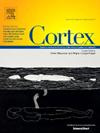Semantic memory in healthy apolipoprotein ε4 carriers: A systematic review
IF 3.3
2区 心理学
Q1 BEHAVIORAL SCIENCES
引用次数: 0
Abstract
The Apolipoprotein epsilon 4 (APOE ε4) genetic variant is notoriously linked to enhanced risk of developing Alzheimer’s Disease (AD). Several studies have examined how this allele could influence cognitive functioning in healthy adults, and whether ε4 carriers show a subtle cognitive decline that would indicate preclinical AD pathology. Research has predominantly focused on episodic memory, where ε4 carriers are usually impaired, while semantic memory functioning has received less attention. To evaluate current evidence on the influence of APOE ε4 on semantic memory, we systematically reviewed the research literature assessing semantic memory in non-clinical adult populations according to the PRISMA guidelines. We reviewed 17 studies that revealed high heterogeneity in how semantic memory is conceptualised and assessed. When tested via standard neuropsychological tests (i.e., category fluency, naming, language comprehension, and general knowledge), ε4 carriers did not significantly differ from non-carriers. Instead, ε4 carriers showed lower performance than non-carriers when assessed via more complex semantic memory tasks (i.e., longer category fluency tasks, autobiographical memory tasks, measures of semantic clustering). The impact of APOE ε4 on semantic memory thus appears to be restricted to these more complex tasks, which could constitute a better match to episodic memory tasks for which APOE effects are typically observed, though a mediating role of executive functions should also be considered. Future research investigating autobiographical memory retrieval in ε4 carriers could provide a more sensitive and ecologically valid assessment of semantic memory and would help disentangle personal and general forms of semantic memory.
健康载脂蛋白ε4携带者语义记忆的系统回顾
众所周知,载脂蛋白ε4 (APOE ε4)基因变异与患阿尔茨海默病(AD)的风险增加有关。一些研究已经研究了这种等位基因如何影响健康成年人的认知功能,以及ε4携带者是否表现出轻微的认知能力下降,这可能表明阿尔茨海默病的临床前病理。研究主要集中在情景记忆上,其中ε4载体通常受损,而语义记忆功能受到的关注较少。为了评估APOE ε4对语义记忆影响的现有证据,我们根据PRISMA指南系统地回顾了非临床成年人群语义记忆的研究文献。我们回顾了17项研究,揭示了语义记忆如何概念化和评估的高度异质性。当通过标准的神经心理学测试(即类别流畅性、命名、语言理解和一般知识)进行测试时,ε4携带者与非携带者没有显著差异。相反,当通过更复杂的语义记忆任务(即长类别流畅性任务、自传式记忆任务、语义聚类测量)评估时,ε4携带者的表现低于非携带者。因此,APOE ε4对语义记忆的影响似乎仅限于这些更复杂的任务,这些任务可能与APOE效应通常观察到的情景记忆任务更好地匹配,尽管执行功能的中介作用也应该被考虑在内。未来对ε4载体的自传体记忆检索的研究将为语义记忆提供更敏感和生态有效的评估,并有助于理清个人和一般形式的语义记忆。
本文章由计算机程序翻译,如有差异,请以英文原文为准。
求助全文
约1分钟内获得全文
求助全文
来源期刊

Cortex
医学-行为科学
CiteScore
7.00
自引率
5.60%
发文量
250
审稿时长
74 days
期刊介绍:
CORTEX is an international journal devoted to the study of cognition and of the relationship between the nervous system and mental processes, particularly as these are reflected in the behaviour of patients with acquired brain lesions, normal volunteers, children with typical and atypical development, and in the activation of brain regions and systems as recorded by functional neuroimaging techniques. It was founded in 1964 by Ennio De Renzi.
 求助内容:
求助内容: 应助结果提醒方式:
应助结果提醒方式:


